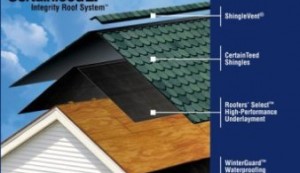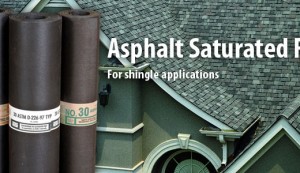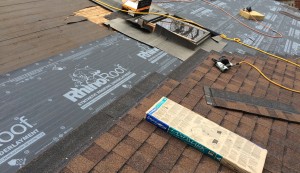
Should You Choose A Synthetic Or Felt Underlayment?
As mentioned in my previous article on roofing materials, a quality roofing underlay is critical to preserving the life of a roof, as well as working in sync with the rest of the roofing system to prevent leaks.
Laid between roofing shingles and roof decking, an underlayment forms a critical secondary barrier, further insulating the roof and preventing heat loss, as well as inhibiting water from percolating onto the roofing deck.
An underlayment is also your temporary insurance in case the first line of defense, the shingles, fail due to ice, storm or wind related damage.
Now that we’ve established its importance, determining which specific type of underlayment is right for your roof requires further consideration such as the climate, efficiency of your home, durability of product, personal preference, and most importantly, your budget.
Let’s compare the differences between felt and synthetic underlayment to help you make the best choice for your roof.

FELT UNDERLAYMENT:
This is really just asphalt saturated paper, which has a heavy density and water resistance as a result.
This has been the product of choice for roofers for decades, and it is still used by many Kelowna roofing contractors today.
The price of felt underlayment is much cheaper.
With savings of upwards of 50% when compared to a synthetic underlayment.
Although this varies when the quality of underlayments is taken into account.
Felt is NOT waterproof.
It is water resistant and, if exposed, will need to be immediately repaired due to the high probability of leaks.
The downside is that it is quite heavy to install.
Usually packed in 15 to 30lbs blocks, with the 30lbs blocks having the greatest water resistant properties and high tear strength.
Therefore, to prevent seepage and to get an effective water barrier, the heaviest felt underlayment should be used.
Made up of high amounts of asphalt and petroleum.
Felt is as a result more sticky and slippery to walk on, making it harder to install and creating safety concerns for roofing contractors.

SYNTHETIC UNDERLAYMENTS:
These are relatively new materials introduced to the roofing market and have various benefits over traditional felt underlays.
They are artificially manufactured, made up of polypropylene, fiberglass, polyethylene and polyester—which are lighter, tear-resistant materials that also offer a more water proof barrier for the roof deck.
The cost of synthetic underlayment is higher than felt.
Often significantly so if specialty products such as DiamondDeck are necessary on a roof.
This is due to the manufacturing and refining costs of the material.
When compared to asphalt felt paper, synthetic underlay offers a more efficient water barrier, being thinner and lighter, with more water proofing capabilities.
Synthetic underlayments are also more resistant to tearing and wrinkling when compared to felt.
Since they don’t absorb moisture, they are impervious to fungal growth.
Synthetics are also UV resistant and can be left exposed on the roof, even in severe weather.
Synthetic underlayment is strong and durable.
Increasing the duration between roof repairs and providing longevity to the entire roofing system.
The chemical composition of synthetics are more stable than asphalt, therefore the degradation process is slower and it prevents the wood deck from drawing tar and other moisture from the shingles.
They are safer to install.
With roofing contractors having more room to move around and by being lighter, thinner and more slip resistant than asphalt felt.
As compared, both felt and synthetic underlayments offer a viable solution to your roofing needs.
Felt does cost less, and that is a factor for many roofing budgets.
Yet when all factors are taken into account, synthetic roofing underlayment is the obvious winner in terms of waterproofing, durability, weight and safety.
In our experience with both types of underlays, we have had greatest customer satisfaction and long lasting durability with synthetic underlayments, such as with CertainTeed and Rhino Roof quality underlays.
At Archer Roofing, we don’t just choose a roofing underlayment based on what we’re comfortable with, we take into account the newest technology, individual home needs and customer budget.
Call us at (250) 808-6297 for a free consultation with one of Kelowna’s best roofers.

